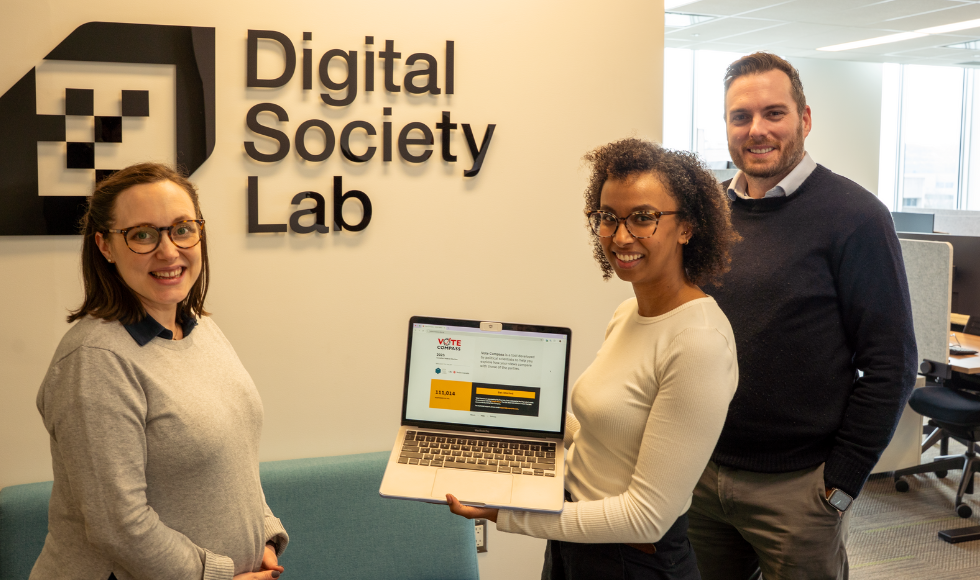Vote Compass: McMaster researchers’ tool helps voters make informed decisions

From left: Joanna Massie, Anwar Sheluchin and Clifton van der Linden, the team behind the current Vote Compass tool.
BY Chris Pickles, Faculty of Social Sciences
April 7, 2025
Three members of the Vote Compass team hunch over a laptop in an office space on campus, watching the number of responses to their CBC voter information tool tick over 100,000 in less than 24 hours.
Joanna Massie and Anwar Sheluchin, PhD candidates in Political Science and fellows at the Digital Society Lab, share a proud moment with Clifton van der Linden, associate professor and director of the lab.
It’s the culmination of months of hard work — developing questions, researching party positions and coding political alignments — to help voters see which party aligns most closely with their personal views.
Van der Linden created the tool, drawing inspiration from similar systems he came across as a PhD student when he spent a year with the Free University of Amsterdam. But he’s quick to downplay that, instead praising the work of his colleagues.
“Without Anwar and Joanna, this latest edition of Vote Compass wouldn’t exist,” he said. “They made it happen.”
More than 30 million people around the world have used Vote Compass in more than 75 elections and referenda over the past 15 years.
Users complete a short questionnaire about their political views, and the tool calculates how those views align with the political parties up for election.
Vote Compass serves an important role in democracy by cutting through the noise, TV ads and social media misinformation that might misrepresent the true positions of each party, the team says.
“We feel proud of what we’ve built,” said Massie. “We know that we’re contributing towards a more informed electorate, and that’s good for democracy.”
The leadup to the federal election
Vote Compass has once again been launched in partnership with CBC Radio-Canada and is featured on the public broadcaster’s website. This is the fifth consecutive federal election in which CBC has featured Vote Compass.
The work for the 2025 federal election started in earnest back in January when it became evident that the election would be called earlier than the fixed date in October.
Massie and Sheluchin undertook a content analysis to catalogue the range of public policy areas that differentiated the parties. They then crafted survey items that reflect those points of differentiation and attributed positions to the parties based on their public statements.
After that they worked directly with parties to validate the representations made about the party positions.
Though Vote Compass is operational, the work is far from over: The tool is recalibrated as parties make announcements signalling shifts in their policy platforms.
When the Conservative Party announced that it would maintain federal commitments to fund pharmacare — a departure from previous party policy — Sheluchin immediately adjusted the party’s position on the issue.
Cutting through the noise
Vote Compass is primarily a civic engagement and electoral literacy tool. It provides voters with an accessible and engaging entry point into talking and thinking about politics.
Using Vote Compass is positively associated with voter turnout and political knowledge, particularly among younger voters, research by the team has demonstrated.
“Our goal is to equip people with a good understanding of where parties sit on issues, not only to help voters understand individually, but also to give them tools to talk to their friends and family about the election, and get more people engaged,” said Sheluchin.
Vote Compass also serves as a rich and novel source of public opinion, which is analyzed in both journalism and academic scholarship as a way of prompting politicians to be more responsive to the public interest.
Analyses of the data from Vote Compass have been featured in hundreds of news articles and dozens of scientific journals.
The tool has been deployed in 11 countries and is currently in running in partnership with the Australian Broadcasting Corporation for the federal election in Australia.
But the Canadian election holds a special place in the research team’s hearts.
“We get to share our hard work with family and friends,” said Sheluchin. “That hits close to home. It makes us really proud.”
The Vote Compass team was aided by research assistants Arnaud Beaulé, Émile Dorion, Nicholas Gaudet, Elsa Labonté, Léo Matrat and Camille Pelletier.


